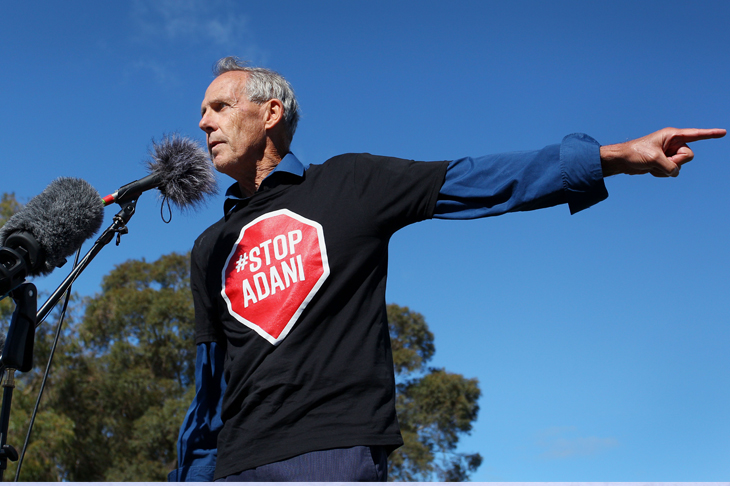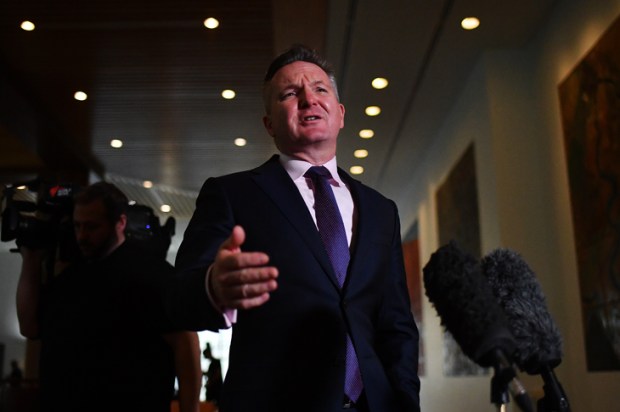On May 24, through gritted teeth, the ABC reported, ‘Adani’s final environmental hurdles set to be finalised within three weeks, Premier announces’.
Following federal Labor’s electoral drubbing in Queensland, especially in Galilee country, Premier Annastacia Palaszczuk quickly concluded it was due to the party’s equivocal position on the future of Adani’s Carmichael coal mine and its promise of thousands of jobs. She immediately agreed to intervene in the process.
Now, after eight years of procrastination, Adani’s environmental approvals are set to be finalised by June 13. ‘Everybody needs to have these issues resolved,’ Ms Palaszczuk said, noting she was ‘fed up’ with the ongoing delays.
What did she expect when Dr Tim Seelig, one of her top environmental policy advisers, is an anti-coal activist and former head of the Queensland Conservation Society? Only two years ago he maintained, ‘we do not believe any new coal mines, including the Adani mine, should proceed given global warming trends and the imperative of carbon emissions reduction’.
When it comes to whipping up anti-Adani sentiment, Dr Seelig has no better accomplice than the national broadcaster. It provides a ready megaphone to any opposing voice.
Resources Minister, Matt Canavan, accused the ABC of running ‘fake news’ as part of a campaign against the mine. He said its reports lacked ‘credibility’ and suggested activists were directing the broadcaster’s coverage. Indeed, Adani itself voiced disappointment that the broadcaster had acted as ‘the mouthpiece for organisations like the Environmental Defenders Office and Coast and Country, which continually make claims that are later proven false’.
Last December, when seeking details on groundwater plans, the ABC demanded a response ‘within three business days’. As the company noted in its reply, the demand came over the Christmas period and, ‘that you sent your inquiry to us after 5pm on the Friday before Christmas’. It asked ABC ‘news’ journalist, Joshua Robertson, to ‘publish our response in full, rather than only cherry-picking certain phrases as you have done in the past’.
Every avenue to block the mine has been availed.
Despite strong support from the mine-site traditional owners (294 voting in favour of an Indigenous Land Use Agreement and only one against), the decision was upended when a Federal Court cast aside precedent and upheld a Western Australian indigenous community appeal, backed by coal activists, and sought unanimity. Conscious of the potential chaos this decision portended, the federal parliament hastily passed an amendment to the Native Title Act, overturning the court’s decision.
Approval then rested on two environmental management plans. One related to the black-throated finch and the other to groundwater management. The federal government has signed off on both. But in Queensland, water management remains the final environmental obstacle. Notwithstanding reports to the contrary, Adani will not tap into the Great Artesian Basin. It can take water from a local aquifer and the Suttor River when it is in flood and then, only after appropriate payment at prevailing commercial rates, after farmers and other local users have been satisfied. The company claims it will use less than one per cent of the available water supply.
A letter, leaked to the ABC (who else?) also draws attention to the outstanding approvals around the proposed railway connecting the Carmichael coal mine to the existing central Queensland rail network.
It followed Adani’s complaint about the state government ‘shifting the goalposts’. The company’s chief executive, Lucas Dow maintains that ‘To say the Queensland government is not interfering in the approvals processes for the Carmichael project, is farcical’.
The reality is that the Galilee Basin, in which the Carmichael mine is located, is potentially host to seven new coal mines. This is a red rag to environmentalists who want to stop Australian coal exports altogether.
In November 2011, a paper, Stopping the Australian Coal Export Boom, authored by representatives from Greenpeace, Coalswarm, and the Graeme Wood Foundation and funded by the Rockefeller Family Fund, sought $3.75 million to finance a campaign to keep Australian coal in the ground.
The paper outlined a strategy to ‘disrupt and delay’ key projects and infrastructure, while gradually eroding public and political support. An activist training camp was established in Bowen, Queensland, for this purpose.
The campaign to stop coal mining in Australia is no backyard show. It is a well-organised, well-funded, internationally-co-ordinated, environmental movement. It is a movement which threatens an industry which employs some 200,000 people directly and indirectly and earns around $65 billion from exports. Production from the proposed Carmichael mine is expected to generate $176.6 million per year for the Mackay region alone and $274.1 million for the state.
Yet, left-wing politicians have been reluctant to support it. It has taken the commonsense of the Australian people who, having just participated in a ‘climate change’ election, have made it clear that they put the economy and jobs ahead of political alarmism.
Scott Morrison is also right to link the Adani project to Australia’s future relationship with India, the world’s fastest growing major economy. Australia’s relative influence there will diminish if it continues to treat Indian trade and investment with disrespect. Delhi well remembers the Rudd government’s repudiation of a Howard government commitment to export uranium to India.
The history of the Adani Carmichael mine makes a mockery of Australia’s claim to be a welcoming destination for foreign investment. To date, the company has spent $150 million over eight years to work through the process, compared to the 18 months it took in Indonesia. These incessant delays highlight an ideological obstacle course which lacks integrity and stains our international reputation.
The ultimate hypocrisy is the spectacle of the Queensland premier, realising her party’s re-election prospects are at risk, moving with lightning speed on decisions which would otherwise have remained in the never-never. It’s a pity the national interest doesn’t warrant the same sense of urgency.
Got something to add? Join the discussion and comment below.
Get 10 issues for just $10
Subscribe to The Spectator Australia today for the next 10 magazine issues, plus full online access, for just $10.
You might disagree with half of it, but you’ll enjoy reading all of it. Try your first month for free, then just $2 a week for the remainder of your first year.














Comments
Don't miss out
Join the conversation with other Spectator Australia readers. Subscribe to leave a comment.
SUBSCRIBEAlready a subscriber? Log in